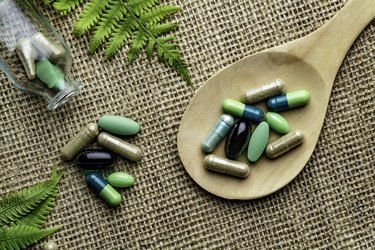
Silica is a natural compound made of silicon and oxygen. You can find in it plant foods, and it's often sold in supplement form to support hair, skin and nail health. But that's not the only perk the mineral may provide — there are other silica benefits to be aware of, too.
Per a May 2013 review in the International Journal of Endocrinology, silica — otherwise known as silicon dioxide — naturally occurs in foods like:
Video of the Day
Video of the Day
- Whole grains like oats, barely and cereals
- Vegetables like leafy greens and green beans
- Beer
It can also be manufactured for use in food products and supplements, which contain forms of silica that the U.S. Food and Drug Administration (FDA) has deemed as safe to use as food additives and anti-clumping agents.
And getting silica in food or supplement form may support various aspects of your wellbeing. Here are some of those silica health benefits and whether or not silica is good for you.
Tip
Remember, the FDA doesn't require supplements to be proven safe or effective before they're sold, so there’s no guarantee that any supplement you take is safe, contains the ingredients it says it does or produces the effects it claims. Accordingly, it's best to talk to your doctor before trying a supplement to make sure it's right for you and to avoid any silica side effects.
1. It Can Strengthen Hair, Skin and Nails
Silica supplements are touted for their ability to improve and strengthen skin, hair and nails, according to a May/June 2016 review in Anais Brasileiros de Dermatologia.
The benefits of silica for skin include improved strength and elasticity because the mineral can help with the formation of collagen, a crucial ingredient for skin health. Taking silica supplements may also improve the fragility of hair and nails, according to the research.
That said, more studies are needed to better understand supplements' safety and effectiveness.
2. It May Prevent Hair Thinning
And that's not all when it comes to silica benefits for hair — the supplement may also battle thinning tresses.
Hair often thins naturally as you age, according to the Mayo Clinic. And while taking silica for hair growth (or regrowth) won't magically reverse balding, there's evidence to suggest that it can strengthen the hair you do have to counteract thinning, which is why people often take silica for hair in the form of supplement pills or gels.
For instance, a daily silica supplement may help reinforce hair strength and prevent breakage, according to the Anais Brasileiros de Dermatologia review.
How Much Silica Should You Take?
According to an April 2013 review in the International Journal of Endocrinology, the safe upper limit of silica intake for humans is 700 to 1,750 milligrams per day, which should help you avoid any side effects while still reaping silica's benefits.
What's more, the FDA says silicon dioxide added to food cannot exceed two percent of a food's total weight.
3. It Promotes Bone and Joint Health
Another potential silica supplement benefit is that it may enhance the health of your bones. That's because the mineral plays a key role in bone development, maintenance, density and strength — so much so that silica supplement uses could include osteoporosis prevention and treatment, according to the April 2013 review in the International Journal of Endocrinology.
Silica also supports collagen formation, per the Anais Brasileiros de Dermatologia review. Besides improving skin elasticity, collagen is an important component of bone structure — without enough of it, your bones can lose density and strength, which is why silica is thought to be good for your skeleton.
Similarly, collagen can help improve the strength and integrity of your joints and connective tissue, according to the Anais Brasileiros de Dermatologia review.
4. It May Promote Immune Function
There's some evidence to suggest that silica supplements may support the health of your immune system, according to a November 2013 review in Interrelations between Essential Metal Ions and Human Diseases. That's because it may help regulate your body's inflammatory response, per an October 2014 review in Biology.
However, more research is needed to better understand how silica benefits your immune system.
Silicosis
Silica has three main crystalline varieties: quartz, tridymite, and cristobalite, according to the National Center for Biotechnology Information.
These varieties are sometimes used in industrial settings like construction, mining and quarrying, where chronic exposure to silica dust can lead to a fatal lung disease called silicosis, per the Occupational Safety and Health Administration.
These forms of silica are different than the safe, FDA-approved versions used in food products and supplements, though, which is why some types of silica are thought to actually support your immune system.
- U.S. National Library of Information, National Center for Biotechnology Information: "Silicon Dioxide"
- Occupational Safety and Health Administration: "Silica, Crystalline"
- Anais Brasileiros de Dermatologia: "Use of Silicon for Skin and Hair Care: an Approach of Chemical Forms Available and Efficacy"
- International Journal of Endocrinology: "Silicon: A Review of Its Potential Role in the Prevention and Treatment of Postmenopausal Osteoporosis"
- International Journal of Endocrinology: "Silicon: a review of its potential role in the prevention and treatment of postmenopausal osteoporosis"
- U.S. Food and Drug Administration: “FDA 101: Dietary Supplements”
- Mayo Clinic: "Hair loss"
- U.S. Food and Drug Administration: "CFR - Code of Federal Regulations Title 21"
- Interrelations between Essential Metal Ions and Human Diseases: "Silicon: The Health Benefits of a Metalloid"
- Biology: "Update on the possible nutritional importance of silicon"
- EvolutionHealth.com: Benefits of Silica